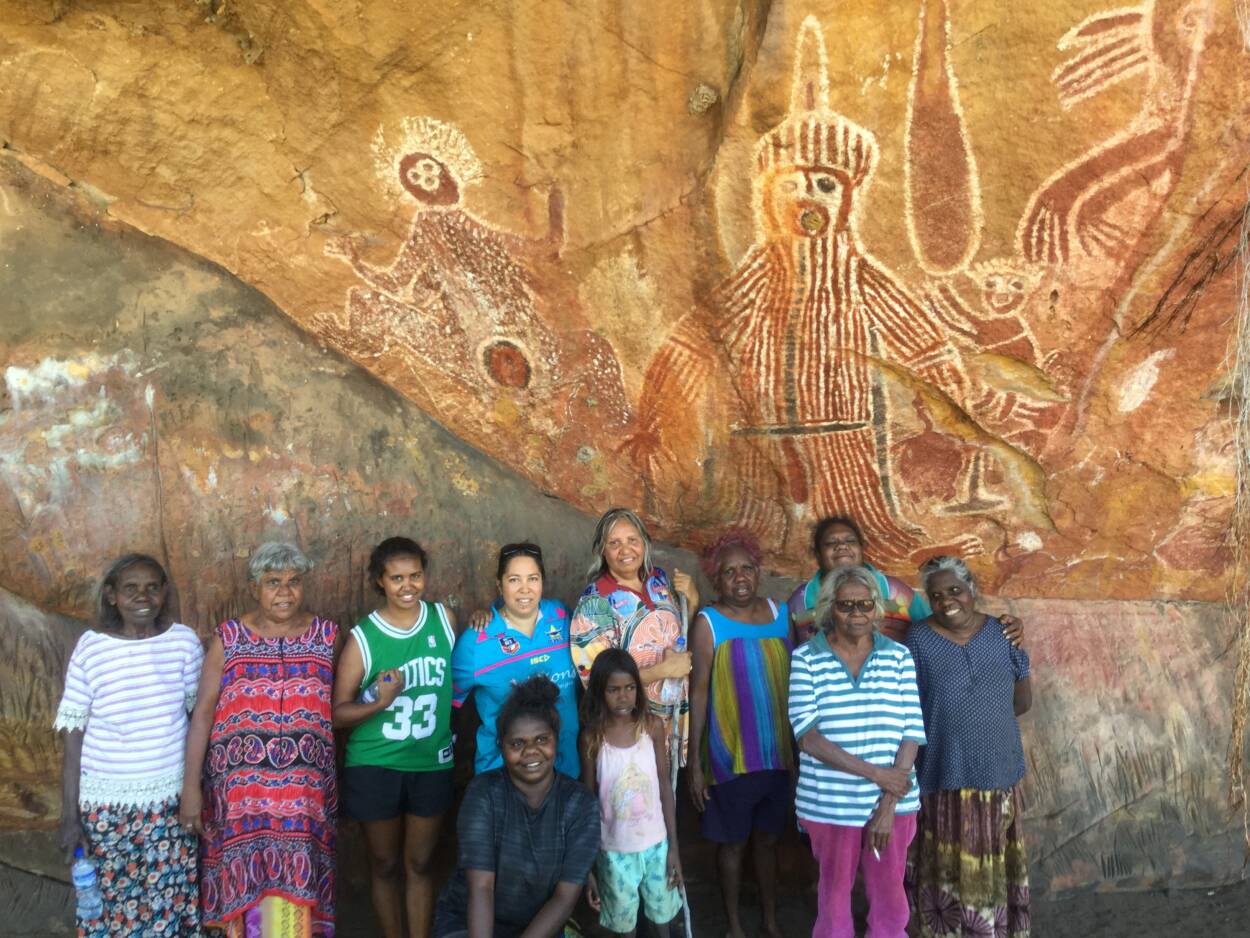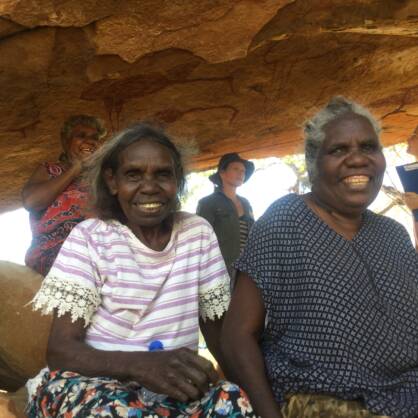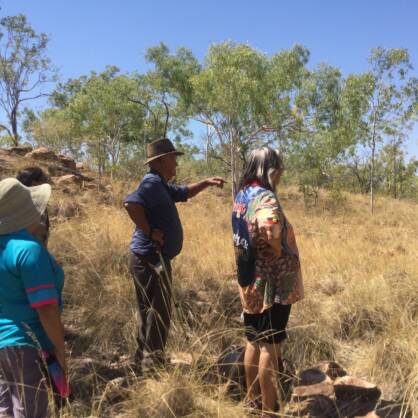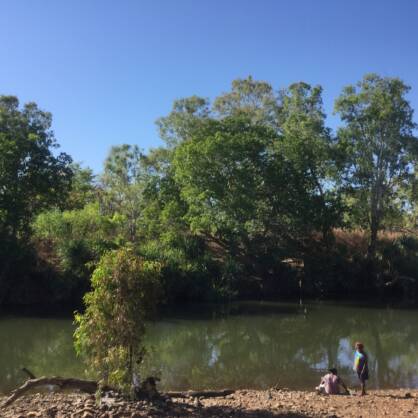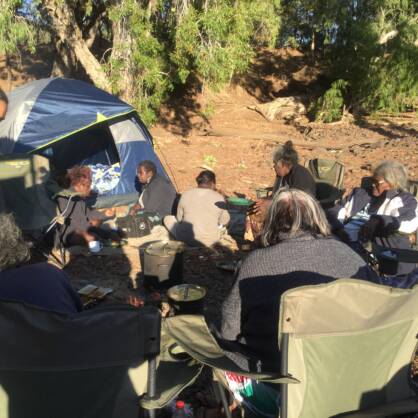Re-connecting Women with Country
Date: Aug 28, 2018
The Northern Land Council’s Caring for Country Branch has adopted a Women’s Employment Strategy in response to the requests from Traditional Owners, community members and women rangers to increase opportunities for women to work as rangers.
Sally Winbirr, Tilly Raymond, Naomi Rosas, Samantha Singh, Chantelle Mota, Natasha Raymond, May Rosas, Patsy Brown, Natalie Blitner, and Florrie Smiler at Nimji rock art site during the Wardaman Women’s Culture Camp.
Aboriginal women are underrepresented across all NLC ranger groups, making up 35 per cent (up 10 per cent since January) of rangers employed by the NLC.
“We developed the Women’s Employment Strategy in consultation with rangers, community members, and NLC council members,” said Penelope Mules, Women and Youth Coordinator for the Caring for Country Branch.
“It identifies the barriers to women working as rangers, sets out the priorities for the future, and sets six key targets to achieve those priorities.”
Those targets include ensuring that women make up 50 per cent of all rangers employed by the NLC, that every ranger group has female representation, and that each group has one or more women in leadership roles (e.g., coordinators, assistant coordinators, or senior rangers).
The strategy includes 44 actions for NLC staff to implement over the next three years. These have been included in annual work plans and individual staff positions descriptions.
Re-connecting women with their traditional lands is part of the NLC’s approach to increasing the number of women rangers. Throughout the dry season, the NLC Caring for Country branch has worked with women Traditional Owners to organise women’s culture camps and walks.
In the last week of July, 30 women from Numbulwar took part in the Women’s Culture Walk, traversing 40 kilometres of coast in the South East Arnhem Land Indigenous Protected Area (IPA).
The walk was an opportunity for young women to learn the country and hear stories from Traditional Owners. They gathered turtle eggs and oysters from the beach, and afternoons were spent fishing and catching crabs. In the evenings, the women gathered around campfires, listening to the old ladies telling stories and cooking the crabs and fish they had caught that day.
“The young women were excited to be visiting places they had heard stories about, and the old ladies were happy to be back on their country, eating bush tucker and teaching the young women,” said Ms Mules.
The 21 younger women walked the distance while the older ladies were driven along the coast in a troopy, supported by the Numbulwar Numburindi Rangers and the Yugul Mangi Rangers.
Meanwhile on Wardaman country, south-west of Katherine, NLC’s Caring for Country branch took 16 women to Ingaladi waterhole in mid August for a women’s culture camp.
Wardaman woman Marie Allen said it was a wonderful opportunity for women to return to country and spend time together.
“I just thought it was a great time for the women because sometimes women tend to be ignored. It was a great for the Wardaman women to get together, exchange stories and talk to the land council about some issues, such as ranger issues.”
Sitting around the campfire each night, they discussed culture and law, and learnt how the families are connected. They spoke about ensuring that half the rangers working on the Wardaman IPA are women. There were a number of suggestions for young women who may be interested in working as rangers. And it provided valuable time to sit quietly together for healing and reconnection with each other.
“It gives them an opportunity to talk. It gives them an opportunity to tell stories. Because they don’t have an avenue in Katherine, to organise that and for them to meet,” said Ms Allen. “I know women in Alice Springs who once a weekend might go out bush together. But we don’t have that. This could be the start.”
For many, it was the first time being on this part of the country.
“The last time I went out to Ingaladi was 25 years ago, something like that. A lot of people hadn’t been there at all. They were really happy, a lot of them. We’ll to try to see if we can have it a bit longer next time.”
Wardaman elder Yidumduma Bill Harney took the group to Nimji, an important rock art site, and explained the creation story of the art there. He taught the group stories about country and who speaks for which country.
“The women went fishing, had a look at the sites. Billy took us to the dreaming sites, and told us stories,” said Marie.
Being able to catch fish was significant for the women, many of whom live in Katherine, where PFAS contamination prevents Traditional Owners from eating fish caught in the waterways. At Ingaladi waterhole they caught black brim and turtle to take back to their families.
“The women are very concerned about PFAS and sad that this has poisoned the local fish and turtles so they are no longer safe to eat,” said Ms Mules. “This made catching enough fish and turtle for their families even more important.”
Ms Allen said she would like to the camp to take place again next year and see more women, particularly young women, come along.
“The only thing I wish is that we could have had more younger women. I think what the older women want is just to pass on some of the cultural stuff, ceremonies, so that they know,” she said. “Maybe it’s something that it could go bigger, it could include other women from different tribes, meeting together and exchanging things.”


